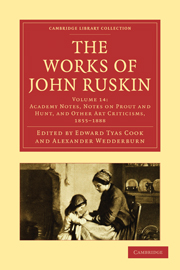Book contents
- Frontmatter
- Contents
- LIST OF ILLUSTRATIONS
- INTRODUCTION TO THIS VOLUME
- PART I “ACADEMY NOTES” (1855–1859, 1875)
- LIST OF ARTISTS AND WORKS MENTIONED IN “ACADEMY NOTES”
- PART II LETTERS AND PAPERS ON PICTURES AND ARTISTS (1858–1887)
- 1 PRE-RAPHAELITISM IN LIVERPOOL (1858)
- 2 GENERALIZATION AND THE SCOTCH PRE-RAPHAELITES (1858)
- 3 JOHN LEECH'S OUTLINES (1872)
- 4 ERNEST GEORGE'S ETCHINGS (1873)
- 5 THE FREDERICK WALKER EXHIBITION (1876)
- 6 ARTHUR BURGESS (1887)
- 7 THE BLACK ARTS. A REVERIE IN THE STRAND (1887)
- PART III NOTES ON SAMUEL PROUT AND WILLIAM HUNT (1879–1880)
- APPENDIX
- Plate section
2 - GENERALIZATION AND THE SCOTCH PRE-RAPHAELITES (1858)
Published online by Cambridge University Press: 05 February 2015
- Frontmatter
- Contents
- LIST OF ILLUSTRATIONS
- INTRODUCTION TO THIS VOLUME
- PART I “ACADEMY NOTES” (1855–1859, 1875)
- LIST OF ARTISTS AND WORKS MENTIONED IN “ACADEMY NOTES”
- PART II LETTERS AND PAPERS ON PICTURES AND ARTISTS (1858–1887)
- 1 PRE-RAPHAELITISM IN LIVERPOOL (1858)
- 2 GENERALIZATION AND THE SCOTCH PRE-RAPHAELITES (1858)
- 3 JOHN LEECH'S OUTLINES (1872)
- 4 ERNEST GEORGE'S ETCHINGS (1873)
- 5 THE FREDERICK WALKER EXHIBITION (1876)
- 6 ARTHUR BURGESS (1887)
- 7 THE BLACK ARTS. A REVERIE IN THE STRAND (1887)
- PART III NOTES ON SAMUEL PROUT AND WILLIAM HUNT (1879–1880)
- APPENDIX
- Plate section
Summary
I was very glad to see that good and firm defence of the Pre-Raphaelite Brothers in the Witness the other day; only, my dear Editor, it appears to me that you take too much trouble in the matter. Such a lovely picture as that of Waller Paton's must either speak for itself, or nobody can speak for it. If you Scotch people don't know a bit of your own country when you see it, who is to help you to know it? If, in that mighty wise town of Edinburgh, everybody still likes flourishes of brush better than ferns, and dots of paint better than birch leaves, surely there is nothing for it but to leave them in quietude of devotion to dot and faith in flourish. At least I can see no other way of dealing. All those platitudes from the Scotsman, which you took the pains to answer, have been answered ten thousand times already, without the smallest effect, — the kind of people who utter them being always too misty in their notions ever to feel or catch an answer. You may as well speak to the air, or rather to a Scotch mist. The oddest part of the business is, that all those wretched fallacies about generalization might be quashed or crushed in an instant, by reference to any given picture of any great master who ever lived. There never was anybody who generalized, since paint was first ground, except Opie, and Benjamin West, and Fuseli, and one or two other such modern stars—in their own estimates,—night-lights, in fact, extinguishing themselves, not odoriferously at daybreak, in a sputter in the saucer.
- Type
- Chapter
- Information
- The Works of John Ruskin , pp. 329 - 331Publisher: Cambridge University PressPrint publication year: 2010First published in: 1904

